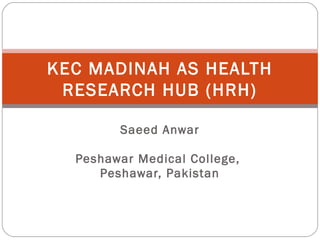KEC Madinah as Health Research Hub
- 1. Saeed Anwar Peshawar Medical College, Peshawar, Pakistan KEC MADINAH AS HEALTH RESEARCH HUB (HRH)
- 2. Why Health Research Hub (HRH)? ’éŚMadinah aspires to regain the lost status as City of Great Knowledge & Economic Activity by becoming modern day Knowledge Economic City (KEC) ’éŚResearch as systematic process of generating and/or value adding knowledge is linked with knowledge part of the KEC, whereas, Health is connected to quality of life, productivity and economic activity ŌĆō the economic part of the KEC ’éŚHence understandably Madinah as a Muslim Sanctuary need to be developed as HRH of Muslim Ummah. Muslim Countries around the world owe allegiance to Madinah and may be conveniently related to HRH Madinah as its Spokes. ItŌĆÖs mutually symbiotic and therefore potentially sustainable
- 3. Objectives of HRH 1. Establish a Health Research Hub (HRH) at KEC Madinah (to which various R&D Disciplines related Centers of Excellence, spread throughout Muslim countries shall be related as its Spokes) with the objects of: ’ā╝ institutionalizing medical & health research focused on generating evidence to highlight the impact of Islamic living (thoughts, values & practices) on physical, mental & social health ’ā╝ create a resource for evolving & communicating consultation based consensus Islamic standpoint on classical, contemporary and emerging health and social issues & problems
- 4. HRH: Objectives ŌĆ” 2. To generate, manage & translate knowledge into development by evolving mechanisms for human and institutional development particularly in the Muslim world 3. To develop HRH as one of the lead learning organization in global health research and development 4. To create awareness and ownership among developing Muslim world countries for the KEC Madinah & HRH
- 5. HRH: Developing a Framework 1. Situational analysis PESTE (political, economic, socio-cultural, technological and environmental) analysis to: - review the current status, capabilities, challenges & risks likely to be encountered while developing the HRH at KEC Madinah - identify factors that may act as potential strengths, weaknesses, opportunities and threats to the initiative at local, national and international levels
- 6. Framework ŌĆ” 2. Respecting & Maintaining the Non-controversial sacred status of Madinah by: ’éŚ Due representation at HRH of the stakeholders/ scientists from various schools of thought ’éŚ Empowered, participatory and consultative work styles at policy, strategic and operational levels ’éŚ Culture of tolerance & respect for differences of opinion ’éŚ Institutionalizing openness to reach out consensus decisions through evidence based dialogue & discourse - Equitable distribution of R&D benefits among Muslim Ummah
- 7. Framework ŌĆ” 3. Sustainability ’éŚ Identifying and bringing in the best Muslim talent in various disciplines (creating HR Directories of Muslim Ummah) ’éŚ Capacity building for R&D a) utilizing the existing talents for R&D activities on one hand, and capacity building of the team members on the other together with knowledge & skills updating mechanisms for all b) broadening the capacity base by adding new expertise, areas & sub areas
- 8. c) Integrating R&D studies into undergraduate & postgraduate student curricula d) Developing partnerships with public & private sectors for R&D e) Encouraging multi-center, multi-ethnic & multi- cultural collaborations for R&D f) Participation in global health research
- 9. Financial Sustainability: ’éŚThe commitment exhibited by KSA for KEC in terms of massive financial inputs needs to be sustained through burden sharing by Ummah in the form of: - Creating an R&D Fund at HRH - Supporting commercialization of KEC products & services - Drawing up joint R&D priorities to be meted out of the Fund All the activities of R&D Fund need to be Riba free
- 10. Continued Commitment: - Attempts at mobilizing all stake holders through: a) communication b) fair treatment c) equitable distribution of R&D benefits d) agreed mechanisms for conflict prevention & resolution Need to remember that actions speak louder than words. Mere location of KEC & HRH at Madinah may not suffice to prevent conflicts
- 11. 4. Culture of Consultation ’éŚConsultation (the Islamic institution of Shoora) is now a globally recognized tool in R&D functions. ’éŚIt is a facility for: 1. Developing new ideas & updating the existing 2. Experience sharing that promotes personal, organizational and social development 3. Creating tolerance, trust, participation, and ownership thus contributing to sustainability 4. Better communication and context understanding to prevent and resolve conflicts Consultation needs to be institutionalized at KEC to harvest its ceaseless benefits
- 12. 5. Defining Roles & Responsibilities ’éŚ The respective roles of HRH and its Spokes must be very clear for: - Smooth operation - Efficiency & effectiveness - Coordination & integration - Conflict prevention
- 13. 6. Ensuring Organizational Dynamism: An organizational setup based on ŌĆśfunctional integration yet administrative DecentralizationŌĆÖ is expected to create a dynamic system with certain degree of autonomy and flexibility to make management responsive to local needs and context
- 14. 7. Knowledge Management ’éŚ Knowledge generated by HRH needs to be translated into development. This will require designing and establishing proper ICT based system of knowledge management
- 15. The most important Sanctity of Holy City of Madinah must be respected and maintained at all costs. The religious, socio- cultural, environmental and e-pollution related hazards need to be safeguarded against at outset and later throughout
- 16. Acknowledgements ’éŚProf. Najibul Haq, Dean Peshawar Medical College (PMC), Pakistan ’éŚProf. Hafeez -ur- Rahman, Vice Dean Academics, PMC ’éŚDr Ayesha S. Abdullah, Vice Dean Medical Education & Research, PMC ’éŚDr Tahir Nadeem Khan, Director M&E, DoH, Khyber Pakhtunkhwa (KP), Pakistan
















